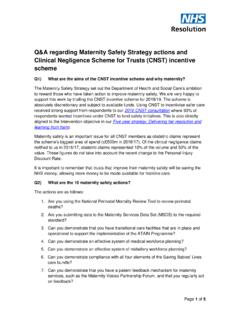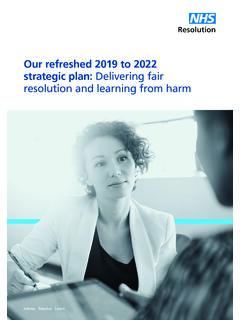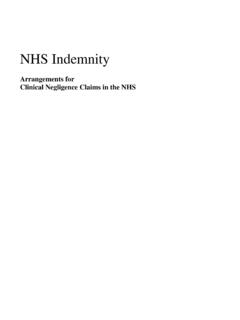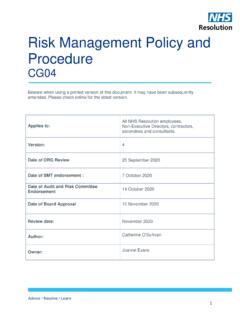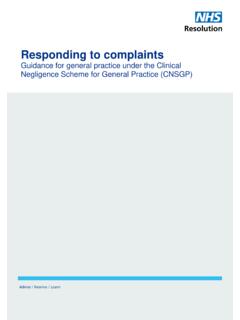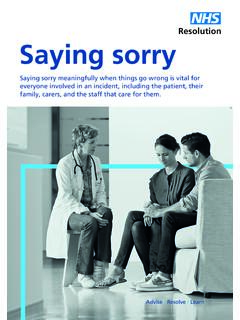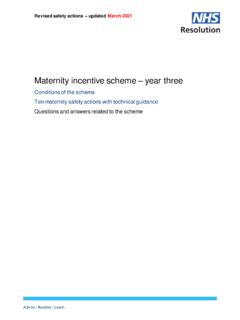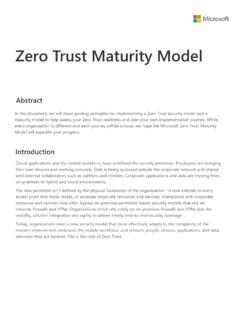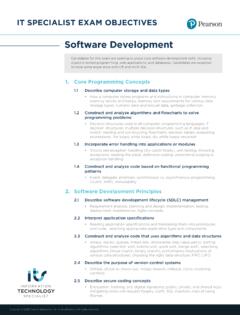Transcription of What do I need to do when I am asked to ... - NHS Resolution
1 What do I need to do when I am asked to disclose records for a compensation claim against me/the practice? Guidance on pre-action disclosure requests in clinical negligence claims 1. It is common for patients (whether through themselves, a family member or other representative) to request copies of their records and other documentation. Such a request could be for many reasons, one of which is because the patient is considering a claim against their general practice practitioner and/or the practice. Disclosure of the patient's records is a crucial part of the claims process because it will enable the claimant and/or NHS Resolution to appoint an independent expert to review them and provide their opinion on the patient's care. General principles of disclosure Disclosure requests can include requests for many different types of documents and information. The most common disclosure request, however, will be for medical records. GPs should always bear in mind the provisions of the General Medical Council's Good Medical Practice (March/April 2013 as amended) when disclosing records.
2 In particular, you should ensure that documents are appropriately redacted where necessary, including removing: Information about any patient other than the subject of the disclosure request;. and Any information which is likely to cause harm to the patient or somebody else. Further guidance can be found on the GMC's website here: You should always satisfy yourself that the person requesting disclosure has the appropriate authority to do so. Further guidance about who can request disclosure and what you should check is set out below. Court order Where a court has made an order that you must disclose a patient's records, you must comply with the order by the date specified in the order. Do be sure to carefully check the wording of the court order and ensure that you only disclose what you have been ordered to, and only disclose the records to the person or organisation named in the order. If the order does not provide this information, or is too vague, you should revert to the person named in the order and ask them to obtain a more precise order.
3 Subject Access Requests (Data Protection Act 2018). Patients have the right to request copies of information held by a practice that relates to them. These requests are referred to as subject access requests ( SAR ). SARs can be made by the patient in writing or verbally. Records must be provided within 2. one month of receipt of the SAR. You cannot usually charge a fee for responding to a SAR. The disclosure can be made electronically if this is cheaper and more efficient but appropriate encryption and/or other data security should be used. You should also make sure that the patient is able to receive the disclosure in electronic format. Sometimes SARs will be made on behalf of a patient by a solicitor, relative or other representative. In such circumstances you should only disclose records if the patient has signed, and the representative has sent to you, a valid form of authority. The form of authority must: Include the patient's full name and address;. Be signed and dated by the patient.
4 Clearly set out what records and/or other information the authority covers; and Specify to whom the disclosure can be made. Records of a deceased patient (Access to Health Records Act 1990). The personal representative of the deceased patient has the right to obtain copies of the deceased's records. The personal representatives will be: In the case of a patient who had a will, the person named as executor of their will (demonstrated by providing copies of the Grant of Probate); or In the case of a patient who died intestate (without a valid will), the person appointed as the administrator of the deceased's estate (demonstrated by providing copies of the Letters of Administration). In addition to the deceased's personal representative, anyone who might have a claim arising out of the patient's death may also obtain copies of that patient's records. This might include the deceased's relatives who were not appointed as the deceased's personal representative. When making such a request, the person requesting must provide a valid explanation as to why they believe they may have a claim and you must be satisfied that the proposed claim does, in fact, arise from the death.
5 Once satisfied, only those records relevant to the potential claim should be disclosed. The timescale for provision of records under this Act is 21 days from the date of the request if all of the patient's records were created within the 40 days preceding the request. If any records were made more than 40 days before the request, the timescale for disclosure is extended to 40 days from the date of the request. If, by the time you receive a request for copies of the deceased's records, you have already returned the records to Primary Care Support England (PCSE), you should direct the person requesting the records to PCSE. However, if you hold the records electronically then these are disclosable. 3. Records of a patient who lacks capacity If a patient lacks capacity to consent to disclosure of their records, there may be an appointed attorney or deputy who can make subject access requests on the patient's behalf. Records of a child Anyone with parental responsibility for a child can request copies of that child's records.
6 Not all parents have parental responsibility and the people who hold parental responsibility can vary from time to time. Parental responsibility can also be held by people or agencies other than the child's mother or father. If you are in any doubt as to whether a person or agency has parental responsibility for a child you should ask for proof. This might be the child's birth certificate or a Parental Responsibility Order made by the Court. In some cases, particularly when dealing with teenagers, you should consider whether the child has capacity themselves to consent to the disclosure of records. If so, you should seek their consent before disclosing the records. Disclosure of documents other than medical records Patients might request, and be entitled to, disclosure of more documents in addition to medical records. This might include for example, meeting notes, complaint files or Notifiable Patient Safety Incident reports. Where these documents refer to the patient in an identifiable way, the documents are disclosable.
7 Any information relating to a third party should be redacted. When the disclosure request is made under the AHRA and the patient is deceased ( by a personal representative or other person who might have a claim), only records created in connection with the care of the patient are disclosable. You should keep a clear record of: Precisely what you have disclosed;. To whom;. On what authority; and When. When you receive a request for disclosure you should consider whether NHS. Resolution 's reporting criteria are met. Separate guidance on the reporting criteria can be found on our website here. If you are unsure at any time in disclosing records which relate to a potential claim under CNSGP (incidents after ), you should not hesitate to contact NHS. Resolution for support. (Published March 2019). 4.
